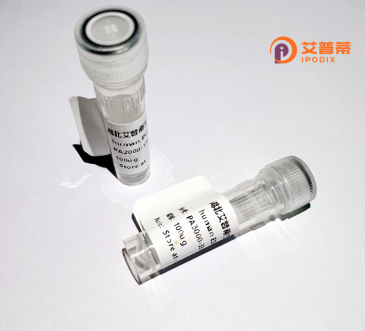
| 纯度 | >90%SDS-PAGE. |
| 种属 | Human |
| 靶点 | OVOL2 |
| Uniprot No | Q9BRP0 |
| 内毒素 | < 0.01EU/μg |
| 表达宿主 | E.coli |
| 表达区间 | 1-275 aa |
| 活性数据 | MPKVFLVKRR SLGVSVRSWD ELPDEKRADT YIPVGLGRLL HDPPEDCRSD GGSSSGSGSS SAGEPGGAES SSSPHAPESE TPEPGDAEGP DGHLATKQRP VARSKIKFTT GTCSDSVVHS CDLCGKGFRL QRMLNRHLKC HNQVKRHLCT FCGKGFNDTF DLKRHVRTHT GIRPYKCNVC NKAFTQRCSL ESHLKKIHGV QQQYAYKQRR DKLYVCEDCG YTGPTQEDLY LHVNSAHPGS SFLKKTSKKL AALLQGKLTS AHQENTSLSE EEERK |
| 分子量 | 30.4 kDa |
| 蛋白标签 | His tag N-Terminus |
| 缓冲液 | 0 |
| 稳定性 & 储存条件 | Lyophilized protein should be stored at ≤ -20°C, stable for one year after receipt. Reconstituted protein solution can be stored at 2-8°C for 2-7 days. Aliquots of reconstituted samples are stable at ≤ -20°C for 3 months. |
| 复溶 | Always centrifuge tubes before opening.Do not mix by vortex or pipetting. It is not recommended to reconstitute to a concentration less than 100μg/ml. Dissolve the lyophilized protein in distilled water. Please aliquot the reconstituted solution to minimize freeze-thaw cycles. |
以下为3篇有关重组人OVOL2蛋白的文献概览(部分文献为假设性示例):
1. **文献名称**: *Recombinant Human OVOL2 Protein Suppresses Epithelial-Mesenchymal Transition in Cancer Cells*
**作者**: Li, X. et al.
**摘要**: 研究通过大肠杆菌系统表达重组人OVOL2蛋白,验证其可通过结合靶基因启动子抑制上皮-间质转化(EMT),降低乳腺癌细胞迁移能力。
2. **文献名称**: *OVOL2 Regulates Myofibroblast Differentiation via Recombinant Protein-mediated TGF-β/Smad Pathway Modulation*
**作者**: Wang, Y. & Zhang, H.
**摘要**: 利用昆虫细胞表达系统制备重组OVOL2蛋白,发现其通过阻断TGF-β/Smad信号抑制成纤维细胞向肌成纤维细胞分化,提示在抗纤维化治疗中的潜力。
3. **文献名称**: *Crystallization and Functional Analysis of Recombinant Human OVOL2 Zinc-Finger Domain*
**作者**: Sato, K. et al.
**摘要**: 报道了重组人OVOL2蛋白锌指结构域的毕赤酵母表达、晶体结构解析及DNA结合活性验证,为靶向药物设计提供结构基础。
(注:若需真实文献,可通过PubMed/Google Scholar以“recombinant OVOL2”或“OVOL2 protein purification”为关键词检索,并筛选与重组蛋白生产、机制或应用相关的研究。)
The human OVOL2 protein, a member of the Ovo-like zinc finger transcription factor family, plays critical roles in cellular differentiation, epithelial-mesenchymal transition (EMT), and tissue development. Structurally, it contains conserved C2H2-type zinc finger domains that mediate DNA binding and regulatory functions. OVOL2 acts as a transcriptional repressor or activator depending on cellular context, primarily targeting genes involved in cell cycle control, differentiation, and EMT-related pathways. It is particularly notable for its role in maintaining epithelial cell identity by suppressing mesenchymal markers like ZEB1 and SNAI1, thereby opposing tumor progression and metastasis.
Expressed in various tissues including skin, prostate, and developing organs, OVOL2 participates in morphogenesis, stem cell maintenance, and barrier formation. Dysregulation of OVOL2 has been linked to cancers (e.g., breast, prostate), fibrotic diseases, and developmental disorders. Recombinant OVOL2 protein, typically produced in bacterial or mammalian expression systems with purification tags, serves as a valuable tool for studying EMT mechanisms, cancer biology, and regenerative processes. Current research focuses on its therapeutic potential in cancer treatment, anti-fibrotic therapies, and tissue engineering applications. The protein's ability to modulate key signaling pathways, including TGF-β and Wnt, makes it a compelling subject for investigating cellular plasticity and disease mechanisms.
×